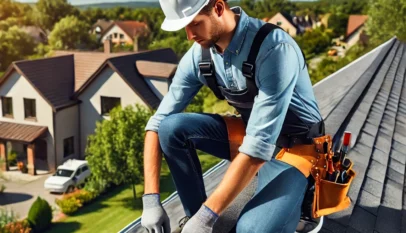
When it comes to maintaining a home, the condition of the roof is often overlooked until a problem arises. Ottawa homeowners face unique challenges due to the region’s variable climate, making it essential to choose roofing solutions that can withstand harsh winters and heavy snow. An effective Ottawa roofing system must provide durability and energy efficiency to protect the home and save on utility costs.
Choosing the right roofing materials is crucial for longevity and sustainability. From asphalt shingles to metal roofing, each option offers distinct advantages that can enhance a home’s value and curb appeal. By understanding these choices, homeowners can make informed decisions that will serve them well for years to come.
Proper installation and regular maintenance play vital roles in the longevity of a roof. Engaging with expert roofing contractors in Ottawa can ensure that the roof remains in excellent condition, preventing minor issues from escalating into costly repairs. Staying proactive about roofing needs not only secures the home but also contributes to its overall safety and stability.
Materials and Techniques
Choosing the right materials and techniques is crucial for a durable roof. Factors like climate, budget, and aesthetics influence these choices significantly.
Shingle Selection: Asphalt to Slate
When selecting shingles, homeowners often choose between materials such as asphalt, wood, metal, and slate. Each type has unique advantages.
- Asphalt shingles are the most popular due to their affordability and ease of installation. They come in various colors and styles, providing good UV protection.
- Wood shingles, typically made from cedar, offer a natural look but require more maintenance to prevent rot and insect damage.
- Metal roofing is durable, fire-resistant, and energy-efficient, making it an excellent option for homeowners seeking longevity.
- Slate tiles provide an elegant, high-end appearance and unmatched durability but come with a higher price tag.
Consideration of local building codes and aesthetic preferences will help narrow down the best option.
Weatherproofing and Insulation
Effective weatherproofing and insulation are essential to maintain energy efficiency and protect against moisture. Various methods are employed to enhance these aspects.
- Underlayment acts as the first line of defense against water infiltration, often made from felt or synthetic materials.
- Roof insulation helps manage temperature within the building. Common materials include fiberglass, foam, and reflective barriers that minimize heat loss.
- Sealing and flashing around vents, chimneys, and valleys prevent water penetration. Quality installation techniques are vital to ensure these elements work effectively together.
Investing in proper weatherproofing and insulation methods can significantly extend the roof’s lifespan and enhance overall energy efficiency.
Installation Standards and Best Practices
Adhering to installation standards and best practices is fundamental for achieving optimal roof performance. This involves various steps that ensure durability and safety.
- Local building codes dictate specific requirements for roofing materials and installation techniques. Compliance is crucial for legal and insurance purposes.
- Proper ventilation is essential to prevent moisture buildup in the attic, which can lead to mold and premature roofing deterioration.
- Experienced contractors should be chosen for installation, ensuring techniques like nailing patterns and layering are executed correctly.
By following industry standards and employing skilled labor, homeowners can maintain the integrity and longevity of their roofs.
Hiring a Reliable Roofing Contractor
Selecting a trustworthy roofing contractor is essential for a successful roofing project. Focus on the contractor’s credentials, their contract details, and their compliance with safety standards.
Assessing Credentials and Reputation
When hiring a roofing contractor, evaluating their credentials is vital. Verify their licensing and insurance coverage to ensure they meet local requirements. A licensed contractor demonstrates professionalism and accountability.
Next, research the contractor’s reputation through online reviews and testimonials. Websites like Better Business Bureau (BBB) and Yelp can provide insights into their reliability.
Ask for references from past clients. Speaking with previous customers can reveal the contractor’s work quality and customer service. A reputable contractor should have a proven track record of completing projects on time and within budget.
Understanding Contract Terms
A detailed contract is crucial in any roofing project. It should outline the scope of work, materials to be used, timelines, and payment schedules. Both parties should clearly understand their responsibilities.
Pay attention to warranty details, including material and labor coverage. A strong warranty protects the homeowner from future costs related to defects or poor workmanship.
Ensure the contract includes provisions for any changes or unexpected issues that may arise during the project. Clear terms regarding change orders and additional costs help avoid disputes down the line.
Ensuring Workplace Safety Compliance
Safety should be a priority when selecting a roofing contractor. Confirm that the contractor follows Occupational Safety and Health Administration (OSHA) guidelines for safe work practices.
Inquire about the safety training provided to their crew. Contractors should regularly train their employees to minimize the risk of accidents on the job site.
Verify that the contractor has safety equipment, such as harnesses and scaffolding, to protect workers. A commitment to safety reflects a contractor’s professionalism and concern for worker well-being.
Zudio Franchise: Unlocking Success in the Retail Market
Zudio franchises represent a unique opportunity for entrepreneurs looking to enter the fas…




